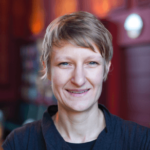
Joint Variational Reconstruction and Motion Estimation via Sparse Dictionary Learning for Robust Optical Flow
Researchers: Timothee Schmoderer, Angelica I. Aviles-Rivero, Noemie Debroux Carola-Bibiane Schönlieb
A central limitation of dynamic Magnetic Resonance Imaging (MRI) is the linear relation between the number of necessary measurements to form an image (task so-called reconstruction; that is – to generate a high quality and clinically interpretable image from raw measurements) and the acquisition time. This constraint induces sensitivity to motion causing image degradation and reducing clinical throughput.
A major challenge in MRI is – how to reduce the data-acquisition time whilst generating high-quality images? In this project, we seek to exploit the strong repercussion of motion during the image formation by developing a single model that links, simultaneously and explicitly, the MRI reconstruction and the physical motion estimation.

